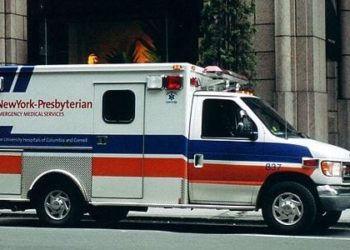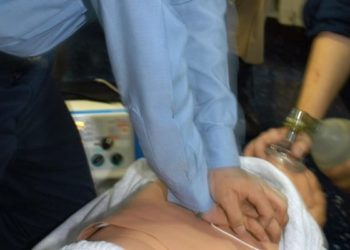Similar clinical outcomes for targeted temperature management at 31C versus 34C in cardiac arrest survivors
1. Moderate (31°C) compared to mild (34°C) therapeutic hypothermia in patients who survived out-of-hospital cardiac arrest demonstrated no significant difference in all-cause mortality and poor neurologic outcomes at 180 days post-randomization.
2. Given the relatively small sample size of this trial, further studies are needed to clarify the role of targeted hypothermia in post-cardiac arrest management.
Evidence Rating Level: 1 (Excellent)
Study Rundown: Out-of-hospital cardiac arrest carries a poor prognosis. Recent evidence has suggested that patients have more favourable neurological outcomes with therapeutic hypothermia of 33°C compared with normothermia in comatose survivors who had a cardiac arrest. Some observational studies have shown neuroprotection under targeted temperatures between 28°C and 32°C. The CAPITAL CHILL double-blind, randomized clinical trial examined whether moderate hypothermia (31°C) improved clinical outcomes compared to mild hypothermia (34°C) in comatose patients who survived out-of-hospital cardiac arrest. Patients were randomly assigned target body temperature management of moderate (31°C) or mild (34°C) hypothermia. All-cause mortality or poor neurologic outcome at 180 days post-randomization was not significantly different between study groups. The median length of stay in the intensive care unit was significantly increased in the moderate hypothermia group. Adverse events, such as deep vein thrombosis and thrombus in the inferior vena cava, were similar between groups. This study was the first randomized controlled trial that evaluated a target temperature below 32°C. Overall, a targeted temperature of 31°C demonstrated no clinical benefit for comatose survivors of out-of-hospital cardiac arrest compared to 34°C. Notably, this study only included patients with cardiac arrest due to a primary cardiac cause; therefore, outcomes may differ for those suffering from cardiac arrest due to other etiologies. Given the relatively small size of this trial, further studies are required to further explore the role of moderate hypothermia in the hospital management of out-of-hospital cardiac arrest.
Click to read the study in JAMA
Relevant Reading: Targeted temperature management at 33°C versus 36°C after cardiac arrest
In-Depth [randomized controlled trial]: This single centre, double-blind, randomized clinical trial included patients aged 18 years and older who suffered from out-of-hospital cardiac arrest and was comatose upon hospital admission from August 4, 2013 until March 20, 2020. There were 193 patients (184 included in the primary analysis) randomized to 31°C and 196 patients (183 included in the primary analysis) randomized to 34°C. The primary outcome was all-cause mortality or poor neurologic outcome at 180 days post-randomization. Neurologic outcome was measured using the Disability Rating Scale (score greater than 5), which assesses functional dependence. Baseline characteristics were similar between study groups. When examining the primary outcome, 89/184 (48.4%) patients in the 31°C group and 83/183 (45.4%) patients in the 34°C group died or suffered from a poor neurologic outcome (risk difference: 3.0% [95% CI: -7.2% to 13.2%]; relative risk [RR]: 1.07 [95% CI: 0.86-1.33]; p= 0.56). Patients in the 31°C group had a significantly longer median length of stay in the intensive care unit compared to the 34°C group (10 days vs. 7 days; p= 0.004). Upon assessment of adverse events, deep vein thrombosis occurred in 21/184 (11.4%) of patients in the 31°C group and 20/183 (10.9%) in the 34°C group (RR: 1.04 [95% CI: 0.59-1.86]; p= 0.88); inferior vena cava thrombus occurred in 7/184 (3.8%) patients in the 31°C group and 14/183 (7.7%) in the 34°C group (RR: 0.50 [95% CI: 0.21-1.20]; p= 0.11).
Image: PD
©2021 2 Minute Medicine, Inc. All rights reserved. No works may be reproduced without expressed written consent from 2 Minute Medicine, Inc. Inquire about licensing here. No article should be construed as medical advice and is not intended as such by the authors or by 2 Minute Medicine, Inc.







